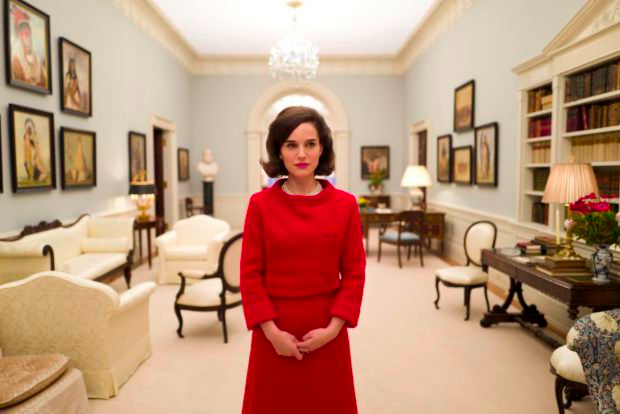In a 1961 interview with Jaqueline Kennedy, Sander Vancour said to the new first lady, “If I may say so, without disrespect, every time I’ve been in the White House it always seems to be a rather cold and austere place.” Director Pablo Larraín takes these words to heart in his new focused biopic, Jackie. Set in the days following John F. Kennedy’s assassination, the film exposes the dark and daring side of Jackie Kennedy as she abdicates her title of First Lady and comes to terms with widowhood. Jackie (Natalie Portman) haunts the halls of the White House, a “cold and austere place” where grief is nearly tangible and tensions are escalated by the eagerly ascending Johnson administration. The end product of Noah Oppenheim’s screenplay, Portman’s acting, and Larraín’s vision is a Jaqueline Kennedy who is equal parts manic and graceful, shattered yet formidable in the face of the world’s unrelenting pity. Jackie is pure hypnotism.
The film flip-flops chronologically, sometimes set in Washington as Jackie prepares her husband’s funeral arrangements alongside her brother-in-law Bobby, and other times shifting to Jackie’s respite in Hyannis, Mass. In Hyannis, Jackie plays a kind of tug-of-war with journalist Theodore White, insisting he spin a story of a Camelot as pristine and idealistic as the Kennedys always intended their reign to be. Most gripping are the scenes of her husband’s death, which show no restraint on the macabre and opt to include every grotesque detail of the assassination. Jackie is dressed in her iconic pink suit, soon splotched with the president’s spilled blood. For the rest of the day, she insists on sporting the stained skirt and jacket, a badge of not just her husband’s sacrifice but her own.
Natalie Portman is a veritable chameleon in Jackie. Her facial contortions exude every anxiety which assuredly gripped Jackie’s mind following the trauma, and she imitates Jackie’s signature voice near perfectly. Oppenheim’s Jackie is not simply a modest homemaker—she is dangerously sharp and perceptive. This personality is all the more appealing in retrospect of the First Lady’s life, and it is hard to not feel for her complexity and psychological torment in the most visceral way.
Was it much a bit much at times? Yes. The film grows frustratingly circular and occasionally overreaches. Jackie’s isolation is sometimes sulky and the auxiliary characters, particularly those of Bobby Kennedy (Peter Sarsgaard) and Lyndon Johnson (John Carroll Lynch), are much less convincing than Jackie herself. Regardless, Jackie’s flaws do not detract from its boldness. It rewrites a defining moment in American history into a triumph of female strength amidst unfathomable personal and public tragedy. The film is not concerned with a strict adherence to the quotidian facts of the Kennedy assassination, yet it feels immensely more important than any glossy look into archived footage or exhausted national folklore. Jackie fractures the perpetuated illusion of the prim and proper Kennedy clan which the country clung to during its most spiritually vulnerable time. It calls into question the Arthurian myth, but ultimately lets the viewer decide if there truly was an American Camelot.





